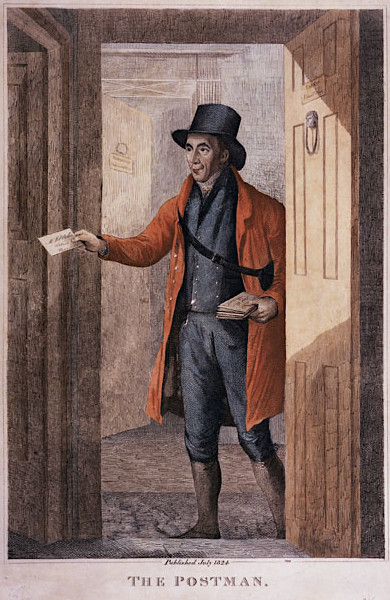![]()
In a few cases, I have significant information about an Alefounder who is not attached to a known family tree.
Richard Alefounder, shoemaker of Harlow, Essex, involved in a legal dispute in 1484.
James Alefounder, Newcastle's first postman, died in 1850.

I am grateful to Vance Mead for finding this case from the court of King's Bench, Easter term, 1484. It begins:
Essex It[em] Johan[ne]s Thurlwynd p[er] attorn[atum] suu[m] op[tulit] se iiijto die V[er]sus Ric[a]rd[um] Alefounder nup[er] de Harlowe in com[itatus] p[re]d[i]c[t]o shomaker Ric[a]rd[um] Sharper nup[er] de Harlowe in com[itatus] p[re]d[i]c[t]o shomaker Johand[um] Noke nup[er] de harlowe in com[itatus] p[re]d[i]c[t]o Waxchaundeler
This is trespass, but exactly what sort is not specified. Usually it's some
combination of breaking and entering, assault, and/or taking goods or livestock.
Sometimes it's about enclosure: A encloses common pasture, B takes his cow there
anyway, so A sues for trespass.
The last three lines are highly abbreviated. They did not come, the sheriff was
ordered to have them attached (goods seized to compel appearance), the sheriff
answers that they have nothing (of value to seize), and the sheriff is then
ordered to arrest them and bring them before the king's court the 15th day of
Trinity term.
The procedure was to order defendants to appear on a particular day. The
defendants got three day's grace: if they appeared in this time, the entry will
be written with their answer. Otherwise, on the fourth day, it will be written
up in this form, with the sheriff ordered to increase the pressure.
Vance Mead found the record for Trinity term:

This says much the same thing except that Sharper is now Sharparowe and the sheriff is now ordered to bring them on the quindene of Michaelmas (two weeks after Michaelmas). There may be more to find on this case, but Vance Mead says, "Far too often there are a few entries and then the case disappears, without any apparent resolution. Either the plaintiff has given up or they have reached some resolution privately." If a defendant does appear, then "the plea rolls will record his answer, and eventually an order to the sheriff to empanel a jury." For an unresolved case where the defendant never appears, he could in the end be outlawed.
![]()

This begins:
Essex It[em] Johan[ne]s Kent de Beauchamp Otton in com[itatus] p[re]d[i]c[t]o yeoman p[er] attorn[atum] suu[m] op[tulit] se iiijto die V[er]sus Johan[ne]s Dasshe nup[er] de Sudbury in com[itatus] Suff[olk] husbondman de p[ar]tito q[uo]d reddat ei quattuor libras et v[er]sus Joh[ann]em Royson nup[er] de Bokkynge in com[itatus] p[re]d[i]c[t]o fuller et v[er]sus Joh[ann]em Alefonder nup[er] de Bokkynge in com[itatus] p[re]d[i]c[t]o carpenter de pl[?ac]ito q[uo]d ???? eor reddat ei? quadraginta solidoe quod ei debent & ???ste detment et v[er]sus Joh[ann]em Norffolk nup[er] de Branktre in com[itatus] p[re]d[i]c[t]o Scolomaist de pl[?ac]ito q[uo]d reddat ei catalla ad valeneitim quatuor libras & quatuor solidor gne ei ?nunste ?etment ~ ~ ~ et ipn~ non ben~ &c et pre? fuit vid q[uo]d smn~ eo? &c vire inad q[uo]d mohiti hent[] &c qa~ capiant^a q[uo]d emt hio in a die pasche in tres septimanas &c Essex Item John Kent of Beauchamp Otten in the county aforesaid yeoman by his attorney appeared on the 4th day against John Dasshe late of Sudbury in the county of Suffolk husbandman about must restore but make the same 4 pounds and against John Royson late of Bokkynge in the county aforesaid fuller and against John Alefonder late of Bokkynge in the county aforesaid carpenter ??????????? must restore ?? 40 shillings that the same owes & ??? ???? and against John Norfolk late of Braintree in the county aforesaid schoolmaster of ???? that owes the same chattels to the value of 4 pounds & 4 shillings ?? ?? ??? ??? ~ ~ ~ and settlement from Easter in three weeks &c Index has Dasshe, John, of Sudbury, Suff, husbandman; Royson, John, of Bokkyng, fuller; Alesonder or Alefonder, John, of Bokkyng, carpenter; Norfolk, John, of Branktre, schoolmaster +++++++++++ Ric[a]rd[um] Sharper nup[er] de Harlowe in com[itatus] p[re]d[i]c[t]o shomaker Johand[um] Noke nup[er] de harlowe in com[itatus] p[re]d[i]c[t]o Waxchaundeler
![]()

Northumberland Record Office have a lithograph portrait of James Alefounder, Newcastle's first postman (ref 438/G/34), dated July 1824, by the artist H. P. Parker. It shows him delivering a letter to the artist's home in Brunswick Place. From the original lithograph (and not clear from the picture on the right) the address on the letter is "Mr. H. P. Parker Artist Newcastle", the sign on the door is "PARKER Portrait Painter" and the door in the background has a sign "Richardson Professor of Music". The writing on the letter in his left hand is illegible.
The following item appeared in the Newcastle Courant on the 4th April, 1835:
The explanation for this can be found on Wikipedia: the prohibition on the use of steam had been included in the original Act to avoid potential objections from surrounding landowners regarding vibration, smoke, noise &c. In the event, the Company did start using steam locomotives before legal authorisation: one landowner objected and obtained an injunction, but given public support for the railway, withdrew his opposition. The amending Bill was duly passed into law.
His wife Jane died in 1840. Newcastle Journal, 31 October 1840, p3: In Percy-place, in this town, on the 25th inst. aged 67, Mrs J. Alefounder. She was buried on the 28th of October at St Andrew's, Newcastle.
I have not found James Alefounder in the 1841 census and as he died in 1850, he is not included in the 1851 census. A notice appeared in the Newcastle Courant for 22 February 1850: In Spring-garden-lane, Gallowgate, on the 17th inst., aged 77, Mr James Alefounder, formerly for many years postman in this town. As yet, I have found no burial record.
![]()
 |
Last updated 7th February 2024 by Peter Alefounder |
 |